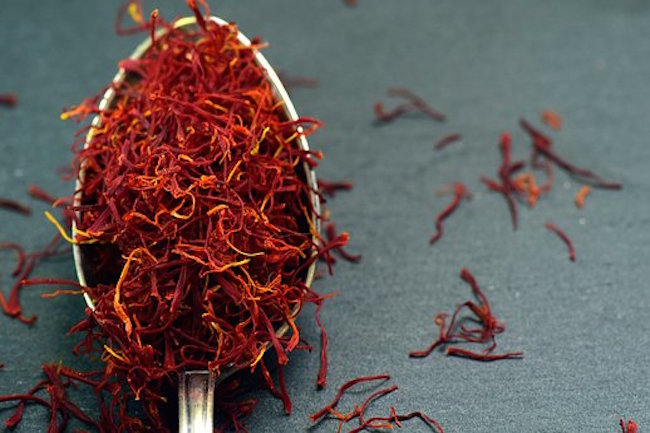Costly Spice Surprisingly Effective for Alzheimer’s by Dr. Joseph Mercola
Saffron is one of the most expensive spices in the world, and for good reason. Evidence suggests this unique and costly spice may have a significant impact on the development and progression of Alzheimer’s disease.1
Saffron is harvested from the stigma of Crocus sativus, a perennial plant belonging to the iris family. The flower has three stigmas of saffron that must be harvested while the flowers are still closed, during the one week every year when the plant flowers.2
It is believed that saffron is native to Greece, but today most of the spice is grown in Iran, Greece, Morocco and India.3 The spice has a complex flavor profile that is difficult to describe. On its own, saffron smells woody with an earthy scent.4
To buy the real deal, saffron can cost up to $13 per gram, or about $365 per ounce.5 To produce 1 ounce of saffron takes 3,000 stigmas, or 1,000 flowers. When you’re buying saffron, look for a dark red or red orange color in which you should be able to see individual threads.
If you found a cheaper saffron, it’s likely fake.6 The stigmas from safflower plants are sometimes substituted and sold less expensively. They do not add the same color or flavor profile to foods, although they smell a little like saffron. Real saffron is sometimes adulterated by grinding up and mixing safflower stigmas to stretch the product.
Saffron as Effective as Drug Against Severe Alzheimer’s
Saffron has historically been used in Persian traditional medicine for the treatment of memory problems. Multiple animal studies have looked at the antioxidant protection saffron may offer along with its protection against cognitive decline and memory deficits.7
In one animal study, researchers used morphine to induce memory loss and found the administration of saffron attenuated the impairment.8 In another study,9 researchers found that animals injected with saffron extract, including the active ingredient crocin, and subsequently subjected to stress, exhibited:10
“… significantly higher activities of antioxidant enzymes including glutathione peroxidase, glutathione reductase and superoxide dismutase and significantly lower total antioxidant reactivity capacity. Finally, crocin significantly decreased plasma levels of corticosterone, as measured after the end of stress.
These observations indicate that saffron and its active constituent crocin can prevent the impairment of learning and memory as well as the oxidative stress damage to the hippocampus induced by chronic stress.”
The main compound, crocin, is a water-soluble carotenoid that has demonstrated potential to protect brain cells in animal and lab studies.11 Saffron extract was tested12 against memantine, a commonly prescribed medication for the symptoms of moderate to severe Alzheimer’s disease. Memantine is an NMDA receptor antagonist that has demonstrated the ability to slow the loss of cognitive abilities.13
Like most medications, memantine has a list of side effects, including vomiting, loss of appetite, unusual weakness, anxiety and aggression.14 Some of these side effects are also common symptoms of moderate-to-severe Alzheimer’s disease, including anxiety and aggression.15
Researchers engaged 68 people with a diagnosis of moderate-to-severe Alzheimer’s disease.16 The group was split into a treatment group and a control group. The control group received memantine at a dose of 20 milligrams (mg) per day while the intervention group received 30 mg per day of saffron capsules for 12 months.
Adverse events related to the intervention or medication were recorded and the participants’ cognitive skills were evaluated every month. The researchers found no statistically significant difference between the two groups. They concluded the saffron extract capsules were “comparable with memantine in reducing cognitive decline in patients with moderate to severe AD.”17
Researchers have been looking at the mechanism of action crocin may take in the brain. During the development and progression of Alzheimer’s disease, tangles and amyloid plaques aggregate in the brain and destroy brain nerve cell function. One lab study18 demonstrated crocin has a protective effect on the development of amyloid plaque commonly found with Alzheimer’s disease.
It not only inhibits the formation but disrupts current aggregates of amyloid in the brain. Other hallmarks of the disease are the fibril tangles made of tau protein. Another lab study19 demonstrated crocin had an inhibitory effect on the formation and aggregation of tau protein filaments.




